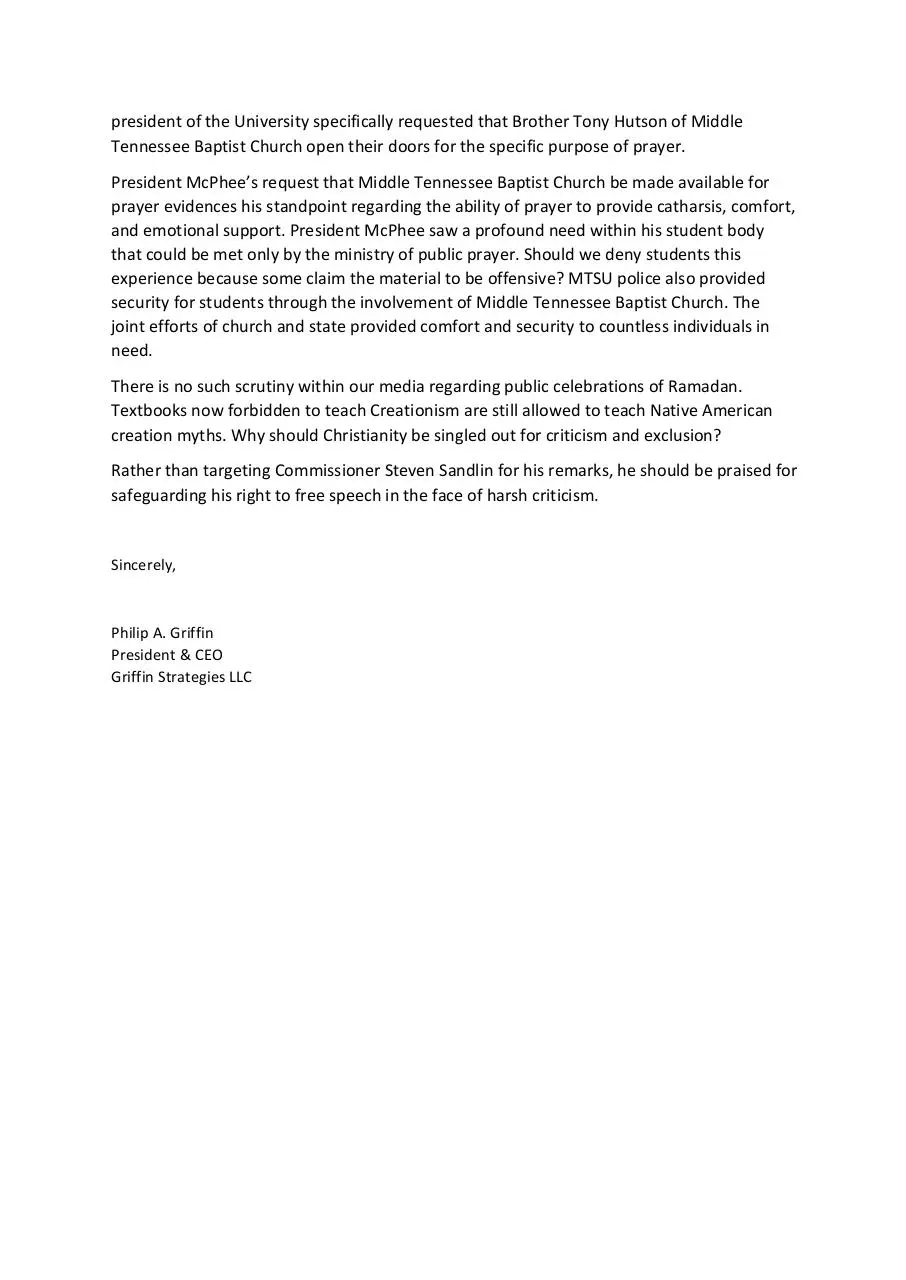Constitutionality of Prayer (PDF)
File information
Title: Microsoft Word - Constitutionality of Prayer.docx
Author: Philip A. Griffin
This PDF 1.3 document has been generated by Word / Mac OS X 10.8.4 Quartz PDFContext, and has been sent on pdf-archive.com on 16/08/2013 at 00:05, from IP address 98.240.x.x.
The current document download page has been viewed 771 times.
File size: 34.98 KB (2 pages).
Privacy: public file


File preview
Philip A. Griffin
424 Elaina Lane
Murfreesboro, TN 37128
Philagriffin@gmail.com
On Monday, August 13th, an article was written regarding the debate and controversy
surrounding a recent prayer made at a public event by commissioner Steve Sandlin. The
Constitutionality of this public prayer was mentioned several times within this article.
The legal principles on which our country was founded are very specific. Though rooted in
religious philosophies (most notably in Puritanism) the Constitution clearly calls for freedom
of speech, and freedom of religion. Questioning the constitutionality of Christian prayers
without subjecting atheist practices to the same scrutiny, seems to evidence a deeply held
political bias. The purpose of this letter is to assert that individuals should maintain their
right to religious freedom which allows them to offer public prayer as an act of free speech.
I support Commissioner Steven Sandlin’s actions, and feel that he was well within his rights
to offer a public prayer at the recent dedication of Stewart’s Creek High school. Instead of
offering the recommended moment of silence, Sandlin, as an alternative, spoke his prayer
out-‐loud, setting a powerful precedent for the next generation. Mayor Burgess succinctly
elucidated on my point by saying that “every citizen should have the right to prayer in a
public manner and in a way that reflects his sincere beliefs about his relationship with his
God” (Burgess, 2013). I would like to express my heartfelt gratitude to Commissioner Steve
Sandlin, and those who follow his example. To pray publicly is to reject the zeitgeist which
insists that practicing prayer publicly is a violation of the rights of others.
Public prayers were not an issue during the shooting at Sandy Hook Elementary, nor was our
nation seemingly offended by the thousands of prayers offered up by elected officials and
celebrities for the victims of 9/11. In fact, in the wake of 9/11 prayer walls sprung up all over
New York City. Jewish Yeshiva students kept a solemn 24 hour watch over vans containing
the remains of all the deceased, despite the victims’ religious affiliations.
Even though Mayor Bloomberg banned prayer from the 9/11 memorial, scores of New York
Churches opened their doors to the faithful-‐ providing safety, warmth, and sanctuary in a
time of crisis. Why then, should the dedication of a new building create such unnecessary
controversy? Why is prayer acceptable during times of extreme national duress, but then
unacceptable at events in which no blood has been shed? This dichotomy seems to
represent a profoundly alleged partiality within the average American psyche.
The University president of Middle Tennessee State, Sydney McPhee opened a chapel for
prayers in the wake of 9/11, without being the subject of such vitriolic criticism. The
president of the University specifically requested that Brother Tony Hutson of Middle
Tennessee Baptist Church open their doors for the specific purpose of prayer.
President McPhee’s request that Middle Tennessee Baptist Church be made available for
prayer evidences his standpoint regarding the ability of prayer to provide catharsis, comfort,
and emotional support. President McPhee saw a profound need within his student body
that could be met only by the ministry of public prayer. Should we deny students this
experience because some claim the material to be offensive? MTSU police also provided
security for students through the involvement of Middle Tennessee Baptist Church. The
joint efforts of church and state provided comfort and security to countless individuals in
need.
There is no such scrutiny within our media regarding public celebrations of Ramadan.
Textbooks now forbidden to teach Creationism are still allowed to teach Native American
creation myths. Why should Christianity be singled out for criticism and exclusion?
Rather than targeting Commissioner Steven Sandlin for his remarks, he should be praised for
safeguarding his right to free speech in the face of harsh criticism.
Sincerely,
Philip A. Griffin
President & CEO
Griffin Strategies LLC
Download Constitutionality of Prayer
Constitutionality of Prayer.pdf (PDF, 34.98 KB)
Download PDF
Share this file on social networks
Link to this page
Permanent link
Use the permanent link to the download page to share your document on Facebook, Twitter, LinkedIn, or directly with a contact by e-Mail, Messenger, Whatsapp, Line..
Short link
Use the short link to share your document on Twitter or by text message (SMS)
HTML Code
Copy the following HTML code to share your document on a Website or Blog
QR Code to this page

This file has been shared publicly by a user of PDF Archive.
Document ID: 0000117810.